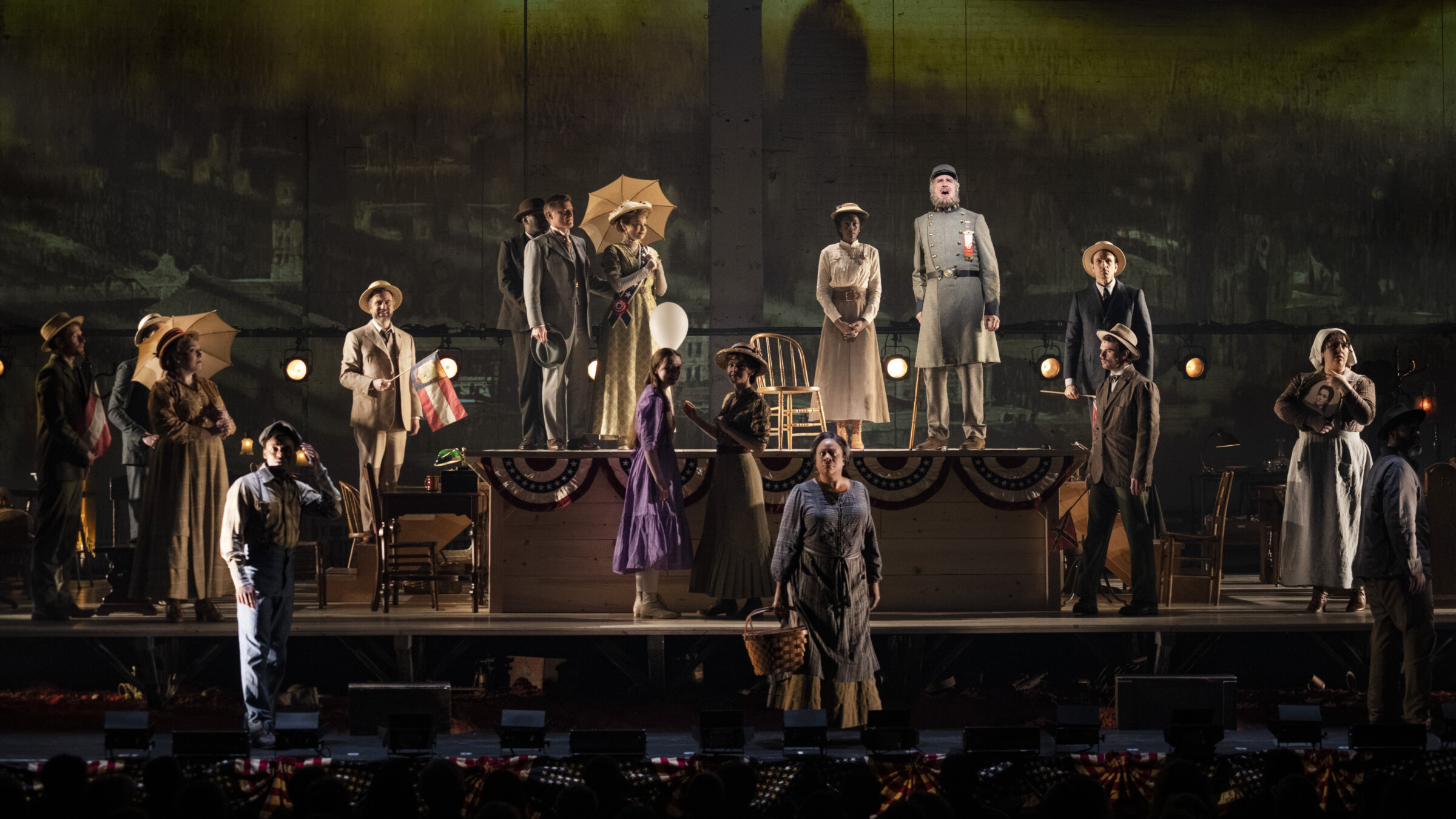In ‘Parade,’ a tragedy of antisemitism is timely as ever — and it wants you to notice
Ben Platt stars as Leo Frank in a stripped-down revival of the epic Broadway musical

Parade centers on the 1913 trial of Jewish factory manager Leo Frank. Photo by Joan Marcus
There’s a moment near the end of Parade when Leo Frank sings the Shema. Surrounded by a mob intent on killing him, he quivers in a nightshirt, a sack tied around his waist for modesty, a noose around his neck. The harsh rattle of a military drumbeat stops, and a tense silence fills the air. Leo’s prayer cuts through the quiet.
Frank, a Jewish factory manager wrongfully convicted of murder, chooses his last words according to tradition. But in Parade, he sings them to a different melody than he would have in synagogue: the Confederate anthem that recurs throughout the musical. Facing death, Leo, a Yankee pariah to the people of Atlanta, is finally a Jew and a Georgian in the same breath. Ben Platt, the first Jewish actor to play Leo on Broadway, makes the scene all the more poignant, imbuing the familiar Hebrew with a mournful defiance.
At that moment, I became acutely aware that people around me were crying. I thought I’d be crying too — I teared up listening to the original cast recording on the train earlier this week — but I never got there. The house lights glowed dim, as if anticipating the sniffles and sobs from the audience to claim them as part of the show. Yet my lack of tears crystallized what I’d been feeling throughout the performance: that while the production’s music, staging and design components are, by and large, beautifully rendered, its reach for contemporary resonance gets in the way of the show’s emotional landing.
Set in Marietta, Georgia, Parade centers on the 1913 trial of Leo Frank, a Jewish factory manager accused of the rape and murder of Mary Phagan, a 13-year-old employee. With a book by Alfred Uhry and an epic, sweeping score by Jason Robert Brown, the musical examines the legacy of American prejudice. Through false testimonies and sensationalized media coverage, the a community’s grief and confusion erupts into the antisemitic hysteria that fueled Frank’s conviction and subsequent lynching.
At the heart of the story is the relationship between Leo, a neurotic New Yorker, and his genteel, assimilated wife, Lucille, played by a fiercely self-possessed Micaela Diamond. Initially distant in their marriage (he calls her a “meshuggener” for celebrating Confederate Memorial Day; she disparages his Yiddishisms), the couple falls in love as they fight to overturn his conviction. While Brown’s choral numbers are breathtakingly sung by the 26-person company, it’s Leo and Lucille’s second act duet “This Is Not Over Yet” that gets the night’s biggest ovation.

Directed by Michael Arden, the revival marks Parade’s first return to Broadway since its original run in 1998, which closed after only 84 performances. At the time, New York Times critic Vincent Canby described Uhry’s book as a “collection of notes for a show that has yet to be discovered.” The current revival, which played a sold-out weeklong run at New York City Center in November, uses the revised script and score from a 2007 production at the Donmar Warehouse in London. The story leaves little room for ambiguity: Leo is a blameless victim, and the people who convict him, like the showboating prosecutor Hugh Dorsey (a spectacularly slimy Paul Alexander Nolan) and the self-righteous newspaper editor Tom Watson (Manoel Felciano) are to blame.
In a landscape of revivals eager to inject old musicals with fresh political relevance, Parade hardly needs to prove its timeliness. The neo-Nazis who rallied outside the show’s first preview were evidence enough. Instead, the challenge of Parade lies in calibrating the balance of politics and pathos. Lean too heavily into Brown’s soaring score and you miss the sinister violence brewing beneath songs of Christian sympathy. Veer too far into the mechanics of the trial or the making of the mob, and the show becomes didactic.
Arden’s direction works best when it’s excavating the musical’s murky darkness, where grief makes a community’s latent prejudice vulnerable to radicalization. During the musical’s opening number, the white characters wave Confederate flags, beaming at the Memorial Day parade while the Black cast members remain conspicuously silent. In a chilling solo at Mary’s funeral, her young friend Frankie Epps (Jake Pedersen) resolves to avenge her. By the second act, the teenage factory girls march at the front of a mob calling for Leo’s death.
The trial sequence that ends the first act is a masterclass in musical storytelling. As witnesses take the stand, each testimony is more damning than the last. In a haunting trio, Mary’s friends from the factory echo each others’ accounts of Leo as a sexual predator. The song morphs into the sleazy, ragtime “Come Up to My Office,” where Leo acts out their false testimony. With Platt as the ravenous puppet-master of their dance, we see Leo the way the rest of Georgia sees him. In another standout moment, the factory’s Black janitor Jim Conley (Alex Joseph Grayson, a powerhouse tenor) stirs the crowd into a revivalist frenzy.
Otherwise, the production’s fixation on the historical echoes of Parade dampens its emotional impact. At times, it’s clear that a stage picture is supposed to mean something, it’s just not clear what. Mary Phagan’s angelic appearance on a rope swing is a confusing foreshadowing to Leo’s lynching. In a particularly puzzling choice, Arden stages Leo and Lucille’s climactic love scene as a parallel of the show’s opening tableau — a young couple making out on a picnic blanket before the young man heads off to fight for the confederacy.
Dane Laffrey’s set makes a courtroom of the stage, with rows of chairs flanking a tall, bare wooden platform at its center. For much of the show, the cast members watch the action onstage from either side, giving an impression of perpetual scrutiny. When the governor and his wife watch Leo’s trial from the theater’s box seats, the courtroom extends beyond the stage, implicating the audience as passive witnesses to the story’s injustice. Sven Ortel’s projections further Arden’s Brechtian show-and-tell approach, flashing historical photographs of the characters when they first appear.
The production’s sparse aesthetic strips away any theatrical pageantry that might distract the audience from the fraught history at its core. For the most part, this approach lets the story shine, particularly in its richly orchestrated ensemble numbers. Still, when the production pushes too hard for salience, it falls prey to a different set of distractions.
At the end of the show, the company sings a reprise of the Confederate anthem in a stunning harmony, this time ready to defend their way of life in Georgia during World War I. A caption projected onto the platform brings Parade into the present, telling the audience that the Fulton County district attorney’s office reopened Leo Frank’s case in 2019.
The young couple from the beginning returns, this time dressed in jeans, holding iPhones and Bud Light. The lights fall as they picnic in the same spot, leaving only the last words of the caption glowing on the platform: “It is still ongoing.” Much more of Parade is still ongoing — the currents of hate and injustice that killed Leo Frank remain strong — but the message would have been clear, regardless.
















